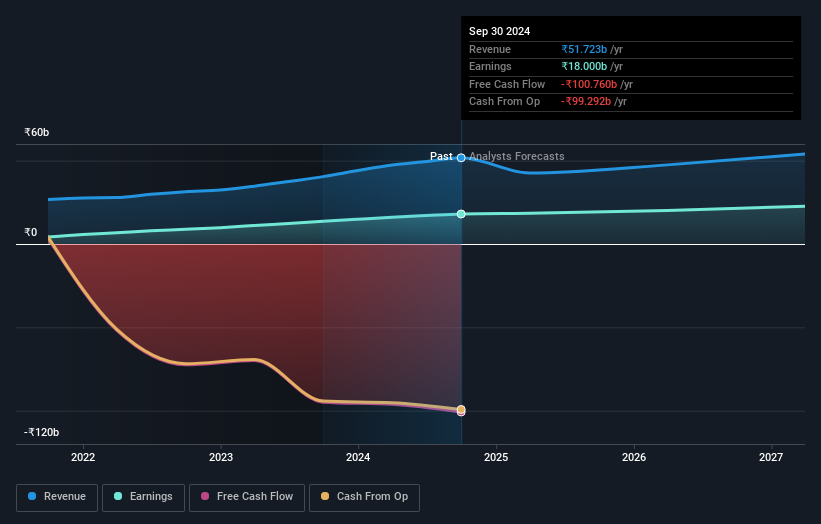Retail investors who have a significant stake must be disappointed along with institutions after The Karur Vysya Bank Limited's (NSE:KARURVYSYA) market cap dropped by ₹11b

Key Insights
- The considerable ownership by retail investors in Karur Vysya Bank indicates that they collectively have a greater say in management and business strategy
- The top 25 shareholders own 45% of the company
- Insiders have sold recently
To get a sense of who is truly in control of The Karur Vysya Bank Limited (NSE:KARURVYSYA), it is important to understand the ownership structure of the business. We can see that retail investors own the lion's share in the company with 51% ownership. In other words, the group stands to gain the most (or lose the most) from their investment into the company.
While institutions who own 43% came under pressure after market cap dropped to ₹169b last week,retail investors took the most losses.
Let's delve deeper into each type of owner of Karur Vysya Bank, beginning with the chart below.
View our latest analysis for Karur Vysya Bank

What Does The Institutional Ownership Tell Us About Karur Vysya Bank?
Institutional investors commonly compare their own returns to the returns of a commonly followed index. So they generally do consider buying larger companies that are included in the relevant benchmark index.
We can see that Karur Vysya Bank does have institutional investors; and they hold a good portion of the company's stock. This suggests some credibility amongst professional investors. But we can't rely on that fact alone since institutions make bad investments sometimes, just like everyone does. When multiple institutions own a stock, there's always a risk that they are in a 'crowded trade'. When such a trade goes wrong, multiple parties may compete to sell stock fast. This risk is higher in a company without a history of growth. You can see Karur Vysya Bank's historic earnings and revenue below, but keep in mind there's always more to the story.

We note that hedge funds don't have a meaningful investment in Karur Vysya Bank. Our data shows that HDFC Asset Management Company Limited is the largest shareholder with 6.3% of shares outstanding. In comparison, the second and third largest shareholders hold about 4.3% and 4.1% of the stock.
On studying our ownership data, we found that 25 of the top shareholders collectively own less than 50% of the share register, implying that no single individual has a majority interest.
While studying institutional ownership for a company can add value to your research, it is also a good practice to research analyst recommendations to get a deeper understand of a stock's expected performance. Quite a few analysts cover the stock, so you could look into forecast growth quite easily.
Insider Ownership Of Karur Vysya Bank
The definition of an insider can differ slightly between different countries, but members of the board of directors always count. Company management run the business, but the CEO will answer to the board, even if he or she is a member of it.
Most consider insider ownership a positive because it can indicate the board is well aligned with other shareholders. However, on some occasions too much power is concentrated within this group.
Our most recent data indicates that insiders own some shares in The Karur Vysya Bank Limited. It is a pretty big company, so it is generally a positive to see some potentially meaningful alignment. In this case, they own around ₹9.3b worth of shares (at current prices). If you would like to explore the question of insider alignment, you can click here to see if insiders have been buying or selling.
General Public Ownership
The general public, who are usually individual investors, hold a substantial 51% stake in Karur Vysya Bank, suggesting it is a fairly popular stock. This level of ownership gives investors from the wider public some power to sway key policy decisions such as board composition, executive compensation, and the dividend payout ratio.
Next Steps:
While it is well worth considering the different groups that own a company, there are other factors that are even more important. Case in point: We've spotted 1 warning sign for Karur Vysya Bank you should be aware of.
If you are like me, you may want to think about whether this company will grow or shrink. Luckily, you can check this free report showing analyst forecasts for its future.
NB: Figures in this article are calculated using data from the last twelve months, which refer to the 12-month period ending on the last date of the month the financial statement is dated. This may not be consistent with full year annual report figures.
Valuation is complex, but we're here to simplify it.
Discover if Karur Vysya Bank might be undervalued or overvalued with our detailed analysis, featuring fair value estimates, potential risks, dividends, insider trades, and its financial condition.
Access Free AnalysisHave feedback on this article? Concerned about the content? Get in touch with us directly. Alternatively, email editorial-team (at) simplywallst.com.
This article by Simply Wall St is general in nature. We provide commentary based on historical data and analyst forecasts only using an unbiased methodology and our articles are not intended to be financial advice. It does not constitute a recommendation to buy or sell any stock, and does not take account of your objectives, or your financial situation. We aim to bring you long-term focused analysis driven by fundamental data. Note that our analysis may not factor in the latest price-sensitive company announcements or qualitative material. Simply Wall St has no position in any stocks mentioned.
About NSEI:KARURVYSYA
Karur Vysya Bank
Provides various banking and financial services for personal and corporate customers in India.
Excellent balance sheet with proven track record and pays a dividend.
Similar Companies
Market Insights
Community Narratives




